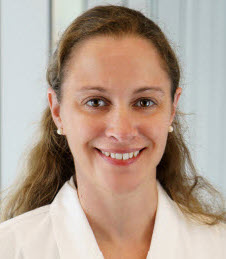VENERE AWARDED AMERICAN CANCER SOCIETY RESEARCH SCHOLAR GRANT
 |
The American Cancer Society (ACS) has awarded a four-year, $800,000 Research Scholar Grant to help a researcher at the OSUCCC – James pursue a new therapeutic strategy for patients with glioblastoma, the most common and most lethal form of brain cancer.
Monica Venere, PhD, assistant professor in the Department of Radiation Oncology at Ohio State and member of the Molecular Biology and Cancer Genetics Program at the OSUCCC – James, received the ACS grant for a project titled “Targeting Kinesins to Radiosensitize Glioblastoma.”
Preliminary data included in her project proposal was generated through support from an Idea Grant funded by Pelotonia, the annual grassroots cycling event that raises millions of dollars for cancer research at the OSUCCC – James.
Arnab Chakravarti, MD, professor and chair of the Department of Radiation Oncology, says the ACS Research Scholar Grant is “one of the most coveted and highly competitive grants in our field.” He notes that Venere is the department’s ninth junior faculty member to become independently funded over the past nine years.
Venere, who was recruited to Ohio State from the Cleveland Clinic in 2016, states in her project proposal that advances in treating glioblastoma (GBM) remain unsuccessful and have not extended median survival for these patients beyond 12-15 months after diagnosis.
She says the severity of GBM is “due in part to a subset of cells within these tumors, commonly referred to as cancer stem-like cells, with therapeutically resistant properties.”
Her project aims to develop a therapeutic strategy that targets a fragile point in a key cell-signaling node that is responsible for maintaining the malignant nature of the cancer stem cells and helps them survive, proliferate and resist radiotherapy, which is a central treatment for GBM.
“We will aim to elucidate how this signaling node functions within cancer stem cells after radiotherapy and then test genetic disruption of this pathway, as well as a small molecule inhibitor that impedes the pathway,” she says, noting that success in impeding the pathway would allow this strategy to be rapidly integrated into GBM therapy.
“Moreover, successful execution of this endeavor promises to bring important insights to the overall cancer biology community,” Venere adds, expressing gratitude for her ACS grant. “The support of the American Cancer Society will enable us to gain a deeper understanding of what drives the malignant nature of glioblastoma and then capitalize on these findings to explore new therapeutic paradigms.”

